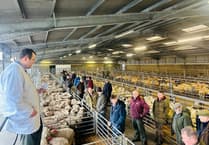With the August bank holiday over for another year politicians will soon be returning to the Senedd and Westminster.
Summer provides a key opportunity for the Farmers’ Union of Wales to lobby MS’ and MPs on the challenges and changes facing Welsh agriculture, particularly at local agricultural shows, which provide a brilliant showcase for rural Wales.
This summer has also provided an opportunity for the FUW to respond to the UK Government’s Farm Profitability Review, chaired by Baroness Minette Batters. This has been a particularly timely review as the profitability and economic viability of farming businesses has been brought into sharp focus on numerous occasions over recent decades as direct farm support mechanisms have changed, and perhaps even more so recently given the debate around inheritance tax reforms and the ability - or rather, inability - for businesses to pay such tax bills.
UK farming, and especially smaller family farms face significant challenges to profitability and economic viability, and in our evidence to the review, the FUW highlighted our concerns that both governments lack a full understanding of the crucial role of direct farm support and the complexity of the UK food system.
Historically, agricultural policies under the Common Agricultural Policy (CAP) aimed to keep consumer food prices low while ensuring fair farm incomes. This model led to many Welsh farms, particularly in Less Favoured Areas (LFA), becoming heavily reliant on direct payments, with some experiencing negative incomes from agricultural product sales alone. Recent data from the Farm Business Survey shows a 39% real-term decline in Farm Business Income (FBI) across Wales between 2023-2024, with LFA cattle and sheep farms seeing a 15 per cen drop.
The shift away from direct payments to an 'income foregone' model for environmental outcomes is happening too quickly, with the failures of the Sustainable Farming Incentive in England as a prime example. It’s clear both the UK and Welsh governments must introduce legislation for monitoring food security, public procurement and processing capacity as a matter of national security.
Amongst our wider evidence to the report, we also include concerns over the perceived low value of food by consumers, trade agreements that could disadvantage UK producers and an increase in on-farm red tape. The FUW argues that trade agreements, such as those with Australia and New Zealand, have failed to provide a level playing field for UK farmers despite government assurances.
The agriculture sector's value extends beyond profitability, underpinning Welsh culture, language, and rural communities. It’s crucial now more than ever that governments deliver a balanced approach that supports economic sustainability, recognising that social, cultural, and environmental benefits then follow in its course.





Comments
This article has no comments yet. Be the first to leave a comment.